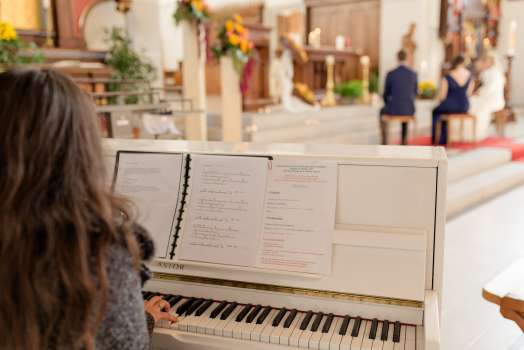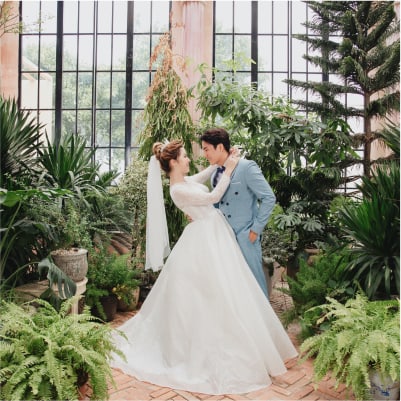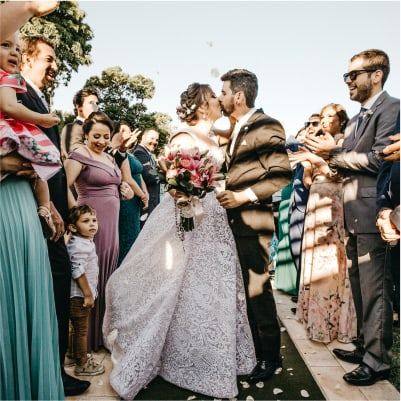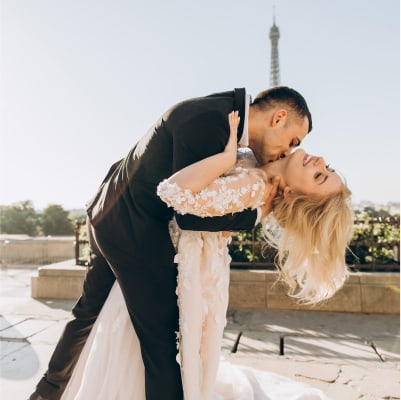My singers and DJ colleagues at Wedding Voice and I know best how we work. Performing at a wedding is a great honor for us, and helpfulness, punctuality, and professional, thoughtful work are part of our professional pride. Even after hundreds of weddings, every wedding is different, and I still can't help but shed a tear or two of joy during the ceremony. But what we have definitely learned from all our conversations with wedding planners, officiants, owners and employees of wedding venues, wedding photographers, florists, etc. is that not all wedding singers are the same! That's why there's no blanket answer to the question “What does a singer actually contribute to a wedding?” The following explanations are based on our own experiences and feedback from our wedding couples and the wedding service providers we have worked with. (By the way: you can find a list of providers that we highly recommend for your wedding in our wedding tips under “Wedding Voice Recommendations.”
A good wedding singer brings calm to the proceedings
This may sound strange at first. But I have often found that, as a wedding singer, I have been able to bring the necessary calm to excited moments, allowing the touching, deep emotions to come to the fore again. Today, I know how to use this skillfully. Here are a few examples:
The hustle and bustle before the ceremony
Before the ceremony, there is almost always a certain amount of nervous tension. The groom paces around the altar, the best man buzzes around the pews like a busy bee, the master of ceremonies goes over his speech one more time, the florists perfect their flower arrangements, the photographers test the best settings, and we musicians are also in the starting blocks, doing sound checks and going over the schedule. But what if the officiant hasn't arrived yet? Or the weather threatens to spoil an outdoor wedding? Some factors cannot be influenced, or only to a limited extent. But with a cool head, good preparation, and above all the right (positive) attitude, the focus on the essentials is not lost, everyone helps each other, and the wedding ceremony becomes all the more emotional and genuine. When the moment arrives and the bride steps forward to the first notes of music, all the hectic preparations are forgotten.
When the wedding guests have not yet fully arrived in the moment
Music can sometimes touch the heart in ways that words alone cannot. When the guests' thoughts are still racing and calm has not yet settled, I have experienced several times that the words of the officiant are beautiful, but they simply do not reach the audience. When the first piece of music begins and, at the latest when the singing starts, everyone—even the youngest—listens. Music and especially the voice simply have a different connection to people's hearts and consciousness. It reaches people in their innermost being, even unconsciously.
Unexpected interruptions and other mishaps
I now have pastors and ceremony leaders who love to work with me as a wedding singer and pianist to create a wedding ceremony. Sometimes there are moments that need to be bridged or that are simply even more beautiful with a few free piano notes. Is a ritual taking longer than planned? No problem, the song is beautiful when played live, even if it takes a few extra bars. I've even had a wedding ceremony interrupted because the bride felt sick. The pastor came to me and asked, “What do we do now?” A few piano notes helped calm things down, and a few songs later, the ceremony continued smoothly.
And of course: music amplifies emotions
Everyone knows it. Music has the power to make emotions even more intense and, above all, to make them much clearer in our memories. Whether it's a church wedding, a non-religious wedding, or a civil wedding, wedding speakers often incorporate the lyrics of songs into their speeches. This not only makes the interplay between speech and music more harmonious, but also makes the entire wedding ceremony much more memorable. When the bride and groom hear their favorite songs during the ceremony, it also brings back associated memories and emotions. This makes their mutual “I do” even more convincing.








